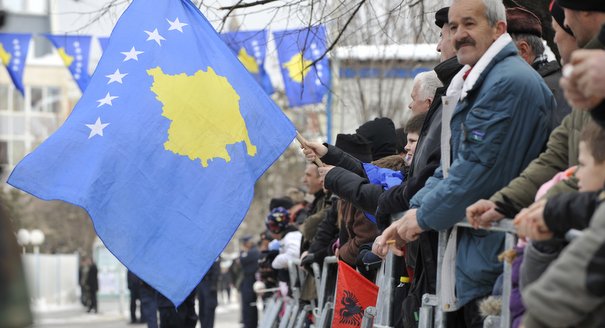On September 10, Kosovo celebrated the end of "supervised sovereignty". Following a proposal put forward by United Nations special envoy Martti Ahtisaari in 2007, the new state remained under international supervision for a number of years. This was to ensure the correct implementation of Kosovo’s commitments, especially regarding the rights of its Serb minority.
The formal completion of this period is rightly considered as a great success in Kosovo. Indeed, the provisions of the Ahtisaari package have, for the most part, been implemented correctly. The joyful celebrations in Kosovo, however, cannot hide the fact that, more than four years after independence, the country’s sovereignty is not in good shape.
Pristina still has no authority over the north of the country. The Serbian majority population in this region continues to reject its integration into Kosovo. The North is run by parallel administrative structures supported by Belgrade. Tensions between the population groups in this part of Kosovo remain high and the international military presence, KFOR, and the European Union police mission, EULEX, barely manage to keep them under control. Incidents happen frequently and can escalate at any moment.
Relations between Belgrade and Pristina are still dominated by the struggle over status. Through EU efforts, limited technical steps to improve relations have been agreed upon. However, dialogue between the two sides was interrupted in the spring of 2012 in view of the elections in Serbia and many of the results of this dialogue have not yet been fully implemented.
Some progress has been achieved regarding the integration of Kosovo into the international community. Kosovo is now a member of the International Financial Institutions and has been recognized by more than 90 countries—about half of the UN member states. But due to the opposition of Russia and Serbia, Kosovo is still excluded from most international organizations. Kosovo is currently negotiating visa liberalization with the EU. The question of concluding a Stabilisation and Association Agreement is under examination by the European Commission. However, the non-recognition of Kosovo by five EU member states greatly hinders the union’s work in a country that needs this engagement more than any other.
While Kosovo’s international position therefore remains difficult, a very important success has nevertheless been achieved. Hardly anyone considers the independence of the country as reversible. Some Serbian politicians may still dream of a division between northern and southern Kosovo along the Ibar River, but given the determined rejection of this option by the international community, their numbers are dwindling. A formal recognition of Kosovo by Serbia remains a taboo that will not go away quickly. Serbia, however, is beginning to gradually come to terms with the territorial arrangements in its region.
Despite their mostly nationalist background, Serbia’s new president, Tomislav Nikolic, and the new coalition government in Belgrade remain committed to an early opening of accession negotiations with the EU. They are fully aware that important EU politicians have linked Serbia's further progress towards Brussels to a significant improvement in its relations with its southern neighbor. Precisely because of their hardline background the new Serb leaders need the international legitimacy that an opening of accession negotiations would provide. And precisely because of their background, they would find it easier to win internal support for significant steps forward on Kosovo than the previous government. In many other cases it was often a nationalist leader who was able to defuse a long unsolved conflict. Nobody can tell if Tomislav Nikolic will have the courage and foresight to move in this direction. But it is certainly worth exploring this possibility.
As Pristina is also fully aware of the difficulties of the present situation, the basic conditions for a new dialogue are in place. This process should have a political character and deal with all the difficult issues including in particular the situation in northern Kosovo. Developing structures for substantial autonomy constitutes probably the only viable approach for this part of Kosovo. The local Serb population will come to terms with being part of Kosovo only if they can continue to run their own lives and maintain close relations with Serbia. Pristina for its part needs guarantees regarding the essential functions of statehood. In some areas, such as education and health care, it should not be difficult to reach a suitable compromise. It will be more difficult to find the right balance when it comes to key instruments of state power such as the police and judiciary.
According to the Ahtisaari package, the Serbian church in Kosovo already enjoys significant rights, but remains interested in additional international guarantees. Given the importance of the Serbian monasteries in Kosovo, such a concession by Pristina would have great confidence-building value.
While reserving their respective legal positions on the status issue, both sides should also agree on a comprehensive framework for cooperation, including the setting up of specific diplomatic relations—similar to the Treaty of 1972 between East and West Germany. As part of a balanced overall package Serbia should also stop opposing Kosovo’s membership in international organizations.
No one should underestimate the difficulties of negotiating such a deal. Due to decades of enmity and mistrust, both sides have a tendency to persist in counterproductive positions on principle. Only an active mediator with great influence on both sides can overcome this resistance and guide them towards compromise solutions. Due to its importance for the future of both countries—Belgrade expects the start of accession negotiations, Kosovo desires negotiations on a Stabilization and Association Agreement—the EU is today in a position to play this role. It should take up this challenge and launch the process without further delay.






